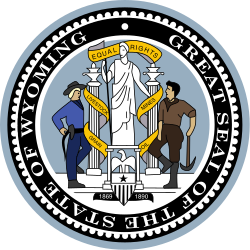| |||||||||||||||||||||||||||||||
16 of 30 seats in the Wyoming Senate Even-numbered seats up, unexpired term in District 1 | |||||||||||||||||||||||||||||||
|---|---|---|---|---|---|---|---|---|---|---|---|---|---|---|---|---|---|---|---|---|---|---|---|---|---|---|---|---|---|---|---|
| |||||||||||||||||||||||||||||||
| |||||||||||||||||||||||||||||||
| Elections in Wyoming |
|---|
 |
The 2004 Wyoming Senate election was held on November 2, 2004, to elect members to the Wyoming Senate for its 58th session as part of the 2004 United States elections. Partisan primaries were held on August 17. All even-numbered seats were up for election as well as an unexpired term for District 1. Republicans picked up three seats in the legislative chamber.

